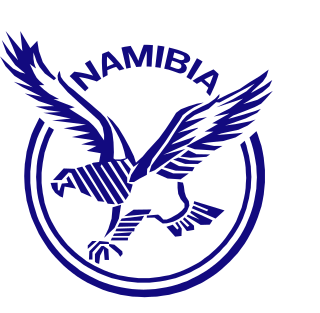
The Namibia national rugby union team represents Namibia in men's international rugby union competitions nicknamed the Welwitschias, are a tier-two nation in the World Rugby tier system, and have participated in seven Rugby World Cup competitions since their first appearance in 1999. They are governed by the Namibia Rugby Union.

The Morocco national rugby union team are a national sporting side, representing Morocco in rugby union. The team is also known as the Atlas Lions. Morocco is governed by the Fédération Royale Marocaine de Rugby. Morocco competes in the Africa Cup annually. The team has won the competition in 2003 and 2005. They usually play their internationals in Casablanca.

The Rugby Africa Cup is a two-year men's rugby union tournament involving the top 16 African nations based on their World Rugby rankings, it is organised by Rugby Africa. The tournament was first held in 2000. It was renamed the Rugby Africa Cup in November 2019, it was previously called the Africa Cup since 2006, the CAR Top 9 and CAR Top 10.

The Madagascar national rugby union team represents Madagascar in the sport of rugby union. Although rugby is popular in Madagascar, the country has not yet qualified for a Rugby World Cup. It does compete annually in the Africa Cup, and was runner-up to Uganda in 2007. The national team's nickname is the Malagasy name for the ring-tailed lemur.

Rugby union in Ivory Coast is essentially amateur, with some degree of semi-professionalization in its top-flight league and the national rugby union team.
The 2011 Africa Cup was the eleventh edition of this tournament. The competition has been restructured into several tiers, based on the IRB rankings.
The 2012 Africa Cup was the twelfth edition of the Africa Cup, an annual international rugby union tournament for African nations organised by the Confederation of African Rugby (CAR). The tournaments between 2012 and 2014 will also serve as qualifiers for the 2015 Rugby World Cup.
The Africa section of 2015 Rugby World Cup qualifying saw thirteen teams competing for one direct qualification spot into the final tournament in England, and one spot in the Repechage play-offs.
The 2013 Africa Cup was the thirteenth edition of the Africa Cup, an annual international rugby union tournament for African nations organised by the Confederation of African Rugby (CAR). This tournament, as well as the 2012 and 2014 editions of it, served as the qualifiers for the 2015 Rugby World Cup.
The 2014 Africa Cup was the fourteenth edition of the Africa Cup, an annual international rugby union tournament for African nations organised by the Confederation of African Rugby (CAR). The tournament, as well as the 2012 and 2013 editions of it, served as the qualifiers for the 2015 Rugby World Cup.
The 2015 Africa Cup will be the fifteenth edition of the Africa Cup, an annual international rugby union tournament for African nations organised by Rugby Africa.
The 2015 Women's Africa Cup Sevens was a women's rugby sevens tournament for the continental championship of Africa and a qualification tournament for rugby sevens at the 2016 Summer Olympics. The competition was held in Kempton Park, South Africa on 26–27 September 2015. It was the fifth all-continental African Women's Sevens Championship, hosting teams from both Northern and Southern Africa.
The 2015 RA Africa Cup Sevens is an Olympic qualification tournament for rugby sevens at the 2016 Summer Olympics held in Kempton Park, Gauteng, South Africa on 14–15 November 2015. It was the 3rd championship in a series that began in 2013.
The 2016 Africa Cup was the sixteenth edition of the Africa Cup, an annual international rugby union competition for African nations organised by Rugby Africa.

Qualifying for the 2019 Rugby World Cup for the Americas began in March 2016, where across 3 years, 20 teams competed for two direct qualification spots into the final tournament, and one spot in the Repechage tournament. For qualification purposes, the two Americas regions Rugby Americas North and Sudamérica Rugby formed the Americas region to compete for the two Americas berths in the World Cup.
The 2017 Rugby Africa season contains a series of rugby union tournaments scheduled for 2017 and organised by the governing body of rugby union in Africa, Rugby Africa. The top-tier event is the Rugby Africa Gold Cup – formerly simply known as the Africa Cup – a six-team competition which was played on a round-robin basis from June to August 2017.
The 2017 Women's Africa Cup Sevens was a women's rugby sevens tournament held in Monastir, Tunisia on 16–17 September 2017. This tournament served as a qualifier for two tournaments, only the winner qualifies for next years 2018 Rugby World Cup Sevens, whereas the top two teams qualify for the 2018 Commonwealth Games which will also be held the following year.
The 2018 Rugby Africa season contains a series of rugby union tournaments scheduled for 2018 and organised by the governing body of rugby union in Africa, Rugby Africa. The top-tier event is the Rugby Africa Gold Cup – formerly simply known as the Africa Cup – a six-team competition which was played on a round-robin basis from May to August 2018.
The 2021–22 Rugby Africa Cup, which doubled as Qualifying for the 2023 Rugby World Cup for Africa began in June 2021, where teams competed for one direct qualification spot into the final World Cup tournament and for one place in the final Qualification Tournament.
The 2012 CAR Women's Sevens was a qualification tournament for the 2013 Rugby World Cup Sevens which took place in Rabat on 29 to 30 September 2012. There was only one spot available in the World Cup for the region since South Africa had qualified automatically from their semifinal placement in the 2009 World Cup Sevens.






